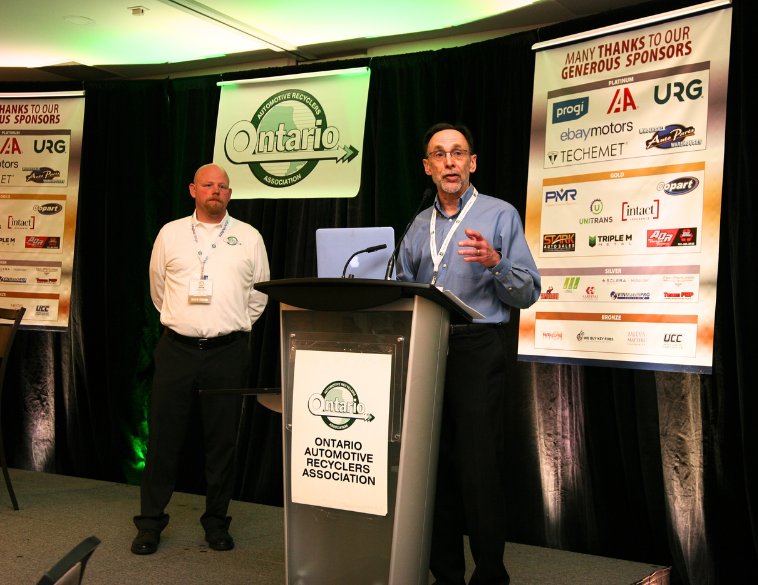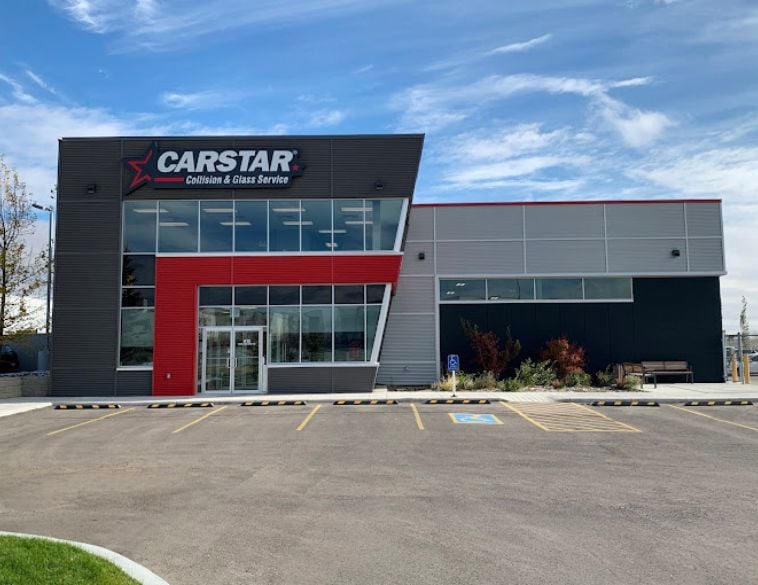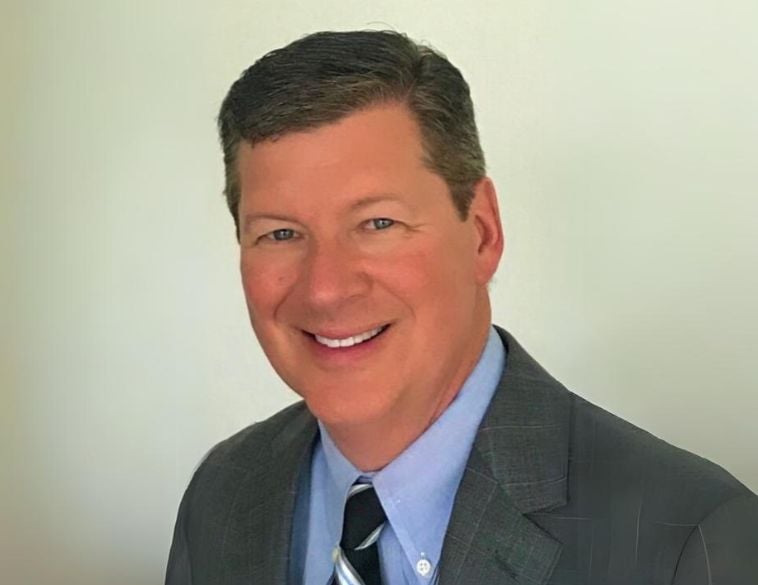Solid turnout, highly interactive discussions and valuable takeaways were key highlights.
From March 30 until April 1, the Ontario Automotive Recyclers Association (OARA), hosted its 2023 Convention & Trade Show at the Hilton Mississauga/Meadowvale just west of Toronto.
For two full days, members of the automotive recycling industry, including facility operators, as well as equipment and solutions providers, OEMs, insurers and consultants, got together to discuss ideas and strategies, as well as collaborate and strengthen opportunities within this crucial sector of the automotive ecosystem.
State of the Industry
OARA Executive Director Steve Fletcher and President Greg Woodbeck, welcomed attendees and provided a State of the Industry address.
A big focus for many larger organizations today is so-called ESG (Environment and Social Governance) practices, and as far as the environmental portion goes, auto recyclers have been at the forefront for some time. ESG practices are being pushed out by large investment funds, with the aim of creating a more sustainable and socially responsible operating model and this is impacting a variety of automotive industry stakeholders including OEMs and insurers.
Through national initiatives like the Canadian Automotive Recyclers Environmental Code (CAREC) auto recyclers from coast to coast have demonstrated their commitment to sustainability and, as OARA Executive Director Steve Fletcher noted, the average score among those recyclers within the program is 95%, up from 83% when CAREC was first established in 2011.
Enviable position
From both an ESG standpoint and also a supply issue, auto recyclers are in an enviable position at present, since in many cases they have the parts that collision centres and mechanical shops need to repair vehicles, alleviating backorder concerns with new OEM and aftermarket parts, plus for every recycled part that’s used, in lieu of a newly manufactured one, the carbon foot print of that repair is reduced since the energy and raw materials required to manufacture that new part are minimized.
Both OEMs and insurers are paying attention and savvy auto recyclers are seeing more opportunities to work with them, not just in Canada but other jurisdictions as well, including the U.S., the UK and Europe.
A keynote session from Rob Rainwater from Profit Team Consulting, focused on another issue that impacts the auto recycling industry, namely Perception. Rainwater asked the audience whether they understood what their customers’ perception of their business actually was.
Rainwater noted that it was critical for recyclers to understand that they are in a people business and customer service is paramount to achieving success.
And this applies not just to those who buy parts from recyclers but also the people that they hire. If the perception of individuals is that your auto recycling business is simply a “junkyard” that has mean Doberman Pinschers roaming free among stacks of scrap cars and parts, it feeds into the stigma and stereotype of the business, which, in reality; is often far from the truth, especially today.
Brand promise
Rainwater discussed the importance of “brand promise,” in other words, living up to your slogan and core mission statement and emphasizing professionalism, from the presentation of your employees and delivery vehicles, to how your sales staff are trained, the warranties and return practices you offer and the standard operating procedures you have in place.
Rainwater also stressed the importance in communicating with customers in a language they understand and not resorting to what he called “Junkyard Jargon,” which can lose clients at the first point of contact.
“Satisfaction, quality, feedback, support and customer loyalty—isn’t that what you’re trying to achieve?” he asked. Yet achieving these goals and consistently delivering on them requires focusing on the brand promise of the organization and demonstrating follow through repeatedly. “Don’t feed into the [stereotype] perception that you’re just another junkyard,” said Rainwater.
If corporations like Nike and McDonalds and can fulfill their brand promises, so can professional, well-run automotive recycling operations.
Tough position
Looking at trends in the automotive recycling, collision repair and insurance sectors, Ryan Mandell, Director Claims Performance at Mitchell International, noted that today, insurers are in a tough position. The growing complexity of vehicles and the repairs needed to fix them as well as the current value of total losses, plus more and more vehicles sitting and waiting for backordered parts has created a perfect storm. Mandell said that the need for insurers to protect their brand reputation by properly servicing the customer has been a major factor in the move toward a virtual claims process.
This means that today, more and more aspects of the estimating process are becoming automated, and this also applies to how parts are selected for each vehicle repair.
“Data is the number one area that we hear feedback from insurance companies, collision centres and other stakeholders in saying I don’t want to spend hours or days calling different places to try and find a specific part,” explained Mandell. “They want the system to find the parts for them.”
For recyclers this means that being laser-focused on inventory is critical, since the easier and more convenient the right part is to locate, the more likely it will be used, meaning more business for the recycler, a more efficient claims process for the insurer, a more profitable repair for the collision centre and a better experience for the customer.
Greater opportunities
Since the onset of the pandemic, a supply/demand imbalance for vehicles, both new and used, as driven values to stratospheric levels, reducing the number of total losses and boosting repairability. This has not only increased opportunities for collision repairers, but also the need for parts suppliers and with OEM and new aftermarket parts still being impacted by supply chain bottlenecks, there has arguably never been a greater opportunity for auto recyclers to step in and help alleviate some of these issues by offering quality used parts.
Additionally, because vehicle complexity has and continues to increase exponentially, new procedures such as pre and post-scans and ADAS calibrations are adding additional time and cost to the estimate and repair. Combined with the increased costs of sourcing new parts, this also presents a very significant opportunity for recyclers to step in and provide a viable, more cost-effective, and environmentally sustainable alternative when it comes to getting the components needed to repair a vehicle and return it to the road.
Shan Lathem, of Cocoa Auto Salvage and President of the Automotive Recyclers Association (ARA) in the U.S., provided an update on the association’s progress, along Eric Wilbert, of Wilbert’ U-Pull It (ARA Vice President/Treasurer). Latham discussed ARA’s Strategic Plan which focuses on four key pillars, namely:
- Branding
- Non-dues revenue
- Government Advocacy
- Education/Certification/Compliance
ARA continues to push forward in helping its members navigate the increasingly complex world of the circular economy as well as provide support for collaboration with other key industry stakeholders, including OEMs and insurers as well as improved and more transparent access to the data recyclers need to run their businesses effectively.
Looking to the future
A panel discussion entitled The Future is Now, brought together David Gold from Standard Auto Wreckers in Toronto, Dalbert Livingstone of Island Auto Supply in Charlottetown, PEI, Ryan Mandell from Mitchell, and Shan Lathem, Cocoa Auto Salvage, along with Rob Rainwater of Profit Team Consulting.
The discussion covered a range of topics, including the opportunities auto recyclers currently have due to issues with backordered parts among collision centres and a need to get vehicles repaired and back out on the road. Additionally, recyclers are learning to leverage the power of modern software solutions, including machine learning to inventory parts more efficiently ensuring they can provide a match for what an insurer is looking for, in reference to a specific claim and vehicle.
Ryan Mandell also discussed the role of OEMs and the growing interest they are taking in the auto recycling sector, as an extension of collision repair. While there have been discussions regarding OEMs getting into the insurance marketplace, Mandell noted that like vehicle manufacturing, modern auto insurance is a low-margin business and given the risk profile and profits available, in practical terms, it doesn’t really make sense for OEMs.
With the rise of OEM certified collision facilities however, we are seeing the trend of OEMs taking a more active role in where the vehicle gets repaired, even though the insurer is still responsible for the claim itself. And this is something for recyclers to consider going forward as it could impact who they sell to, as well as volume and frequency.
Rob Rainwater noted that when it comes to the future, there is no question that the auto recycling business will become more challenging, but for those with the right aptitude and, who are willing to the effort in, it will also lead to more opportunities.
Speaking of opportunities, the auto recycling industry is attracting growing interest from consolidators, such as LKQ, Fenix and Aesop Auto Parts. These organizations, backed by private equity have been buying up high-performing salvage yards in the U.S. and there is the potential for similar trends to happen here in Canada.
While it is a trend that’s set to continue, independent operators can still make themselves a force to be reckoned with by collaborating with others in their area and creating partnerships. Ryan Mandell noted that while size and the ability to scale does bring benefits for consolidators, the bigger the operation, the slower it tends to move, which can mean more opportunities for smaller independents, particularly when it comes to customer service.
“There is an opportunity for consistency,” he said, “and you can create a better product and a better experience for the people who are buying parts. The bigger you are, the harder it is to sustain that level of service.”
Trade show, networking and fundraising
Other highlights of the event included an on-site trade show sponsored by eBay Canada, an evening reception hosted by Techemet and Wholesale Auto Parts Warehouses, plus fundraising, auction and casino activity on the Friday night with proceeds going to the OARA Employee Scholarship program.
Day two of the event attendees had the opportunity to enter a draw for a complimentary trip to the United Recyclers Group (URG) event in Orlando, as well as an update URG courtesy of Amanda Morrison. The day also featured four panel discussions covering everything from Human Resources; to the Ins and Outs of Selling, to Inventory Management tips.
A motivational keynote session hosted by Dr. Kimberley Amirault-Ryan, a Performance Consultant to professional sports leagues, including the NHL, NBA as well as Olympic Athletes, drew a lot of attention. Amirault-Ryan stressed the importance of pursuing excellence and how it is a critical component of long-term success, no matter your pursuit in life.
The event concluded with a second prize draw, this time for a trip to the Automotive Recyclers Association (ARA) event in Kansas City, which runs from October 12-14. With over 400 attendees registered and plenty of interaction during the sessions, as well as superb networking, the expansive trade show, and great entertainment/activities, the 2023 OARA Convention & Trade Show set the standard once again. We look forward to the next one in 2024!



